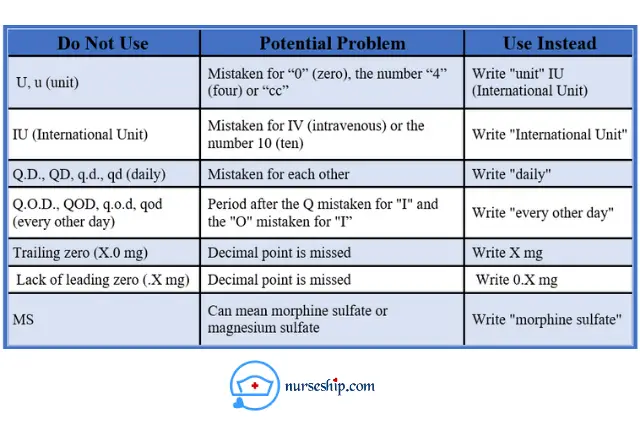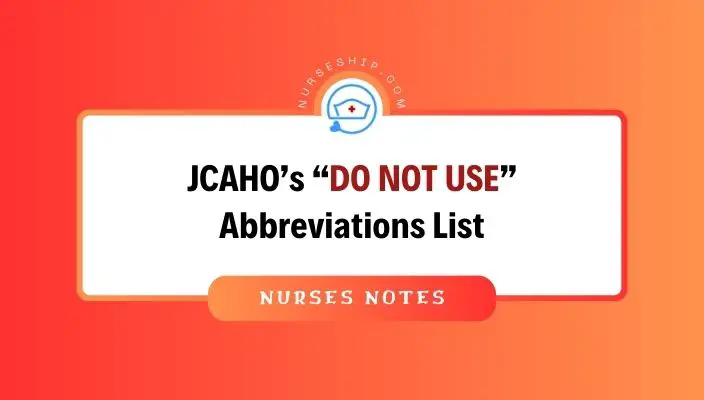In 2004, the Joint Commission on Accreditation of Healthcare Organizations (JCAHO) published its “DO NOT USE” abbreviation for patient safety purposes.
This is to meet the National Patient Safety goal to “improve the effectiveness of communication among caregivers.”
Challenge Yourself With Our Quizzes
According to the JCAHO goal, organizations must use uniform standardized abbreviations, acronyms, and symbols across the organization.
From the beginning of 2004, all JCAHO organizations require the following dangerous abbreviations, acronyms, and symbols to be categorized as a “DO NOT USE” list.
This includes eliminating these abbreviations from written and electronic documentation.
Official JCAHO’s “DO NOT USE” abbreviations list
| Do Not Use | Potential Problem | Use Instead |
|---|---|---|
| U, u (unit) | Mistaken for “0” (zero), the number “4” (four) or “cc” | Write “unit” IU (International Unit) |
| IU (International Unit) | Mistaken for IV (intravenous) or the number 10 (ten) | Write “International Unit” |
| Q.D., QD, q.d., qd (daily) | Mistaken for each other | Write “daily” |
| Q.O.D., QOD, q.o.d, qod (every other day) | Period after the Q mistaken for “I” and the “O” mistaken for “I” | Write “every other day” |
| Trailing zero (X.0 mg) | Decimal point is missed | Write X mg |
| Lack of leading zero (.X mg) | Decimal point is missed | Write 0.X mg |
| MS | Can mean morphine sulfate or magnesium sulfate | Write “morphine sulfate” |
| MSO4 and MgSO4 | Confused for one another | Write “magnesium sulfate” |

The JCAHO also suggests not to use the following abbreviations, acronyms, and symbols.
| Do Not Use | Potential Problem | Use Instead |
|---|---|---|
| µg | Mistaken for mg (milligrams) resulting in one thousandfold dosing overdose. | Write “mcg” |
| H.S.(for half-strength orLatin abbreviation forbedtime) | Mistaken for eitherhalf-strength or hour ofsleep (at bedtime).q.H.S. mistaken forevery hour. All canresult in a dosing error | Write out “half-strength” or “at bedtime” |
| T.I.W. (for three times a week) | Mistaken for three times a day or twice weekly resulting in an overdose. | Write “3 times weekly” or “three times weekly” |
| S.C. or S.Q. (for subcutaneous) | Mistaken for SL for sublingual, or “5 every”. | Write “Sub-Q”, “subQ”, or subcutaneously |
| D/C (for discharge) | Interpreted as discontinue whatever medications follow (typically discharge meds). | Write “discharge” |
| c.c. (for cubic centimeter) | Mistaken for U (units) when poorly written. | Write “ml” for milliliters |
| A.S., A.D., A.U. (Latin abbreviation for left, right, or both ears) O.S., O.D., O.U. (Latin abbreviation for left, right, or both eyes) | Mistaken for each other (e.g., AS for OS, AD for OD, AU for OU, etc.) | Write “left ear,” “right ear” or “both ears;” “left eye,” “right eye,” or “both eyes” |
| > and < | Mistakenly used opposite of intended | Use “greater than” or “less than” |
| / (slash mark) | Misunderstood as the number 1 (“25 unit/10 units” read as “110″ units. | Do not use a slash mark to separate doses. Use “per” |




